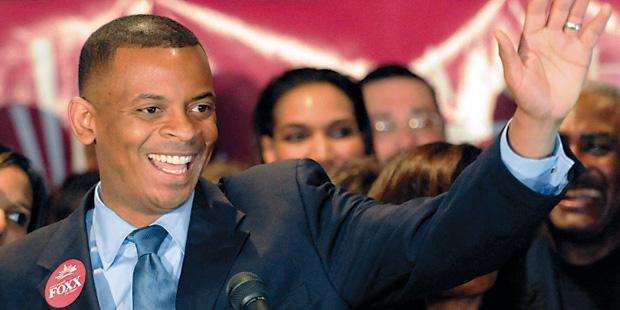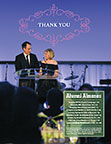Born to Run, Raised to Lead
Anthony Foxx ’96, Charlotte’s charismatic new mayor, has been preparing for this job all his life.
Printer Friendly VersionAnthony Foxx ’96 was weaned on politics. From an early age, he helped make election signs after school. Politics permeated the family dinner discussions, and aspiring politicians called at the house in search of advice from his maternal grandfather, an elder statesman of Charlotte, NC, politics. Foxx and his mother, Laura—a single college student when her son was born—lived with her parents: Mary, now 93 and a retired French teacher, and the late James Foxx Sr., a former educator who was a behind-the-scenes political strategist and tireless party worker. “Anthony grew up at his feet,” says Harvey Gantt, a family friend and former Charlotte mayor.
Last November, Foxx fulfilled his grandfather’s legacy. Just four years after winning a seat on the city council, he was elected mayor of Charlotte, electrifying a city that had been governed by the same mayor since 1995. At 38, Foxx became the city’s youngest mayor and the second African American on the job (Gantt was the first). With his election he also became the first Democrat to hold the part-time office since 1987. “It’s been 22 years since we’ve had this moment,” Foxx told a cheering crowd after the votes came in. “We will work together—Republicans, Democrats, and unaffiliated; white and black and Hispanic.”
In an election that centered on the economy and jobs (Charlotte’s 13 percent unemployment rate is well above the 9.7 percent national average), Foxx positioned himself as the candidate of change, a young leader with a collaborative style, adept at uniting a diverse community. Winning 30 predominantly white, Republican-leaning precincts, Foxx was likened to President Obama. “He’s got Obama’s ability to move comfortably in different worlds and bring people together,” says Jeff Michael, director of the UNC Charlotte Urban Institute. Even Andy Dulin, a Republican on the council, praises Foxx: “He’s got relationship-building abilities, and he’s got that big smile that puts people at ease.”
Foxx has long known something about moving between different worlds. Although his family was not affluent, he grew up surrounded by influential local African American civil rights leaders—family friends include Gantt, U.S. Congressman Mel Watt, and civil rights attorney James Ferguson II. “He’s like my second brother,” says Watt’s son Jason, who celebrates Christmas each year with Foxx and his mom. Then Foxx’s education broadened his horizons. He attended West Charlotte High, a once all-African-American school that became a model of successful integration. “It was a place where the wealthiest white residents sent their kids to sit right alongside middle-class and poor African American kids,” says Foxx. That experience made him comfortable with people of different races and economic circumstances. “I didn’t live my childhood with the walls of separation that my mom and grandparents knew. I didn’t see a wide gulf between people,” Foxx says. “It gives me the ability to lead differently.”
At Davidson College, Foxx, one of just 68 black students, was elected student council president. “He connected with the students. They respected him and felt that he could look out for a broad range of people,” explains Ferguson’s son Jay, who co-wrote a college newspaper column with Foxx.
Graduating from Davidson in 1993 with dreams of becoming a civil rights lawyer, Foxx chose NYU Law. “There was no close second,” says Foxx, a Root-Tilden Scholar. “NYU had a strong footprint in honing public interest lawyers.” Through Professor Randy Hertz’s Juvenile Defender Clinic, he had the opportunity to represent troubled youth at the Family Court in Brooklyn. “He had a real commitment to tackle and reform injustices of all sorts,” says Hertz, “especially those that affected powerless and disadvantaged people.”
Foxx went on to work in every branch of the federal government. He served as a law clerk for Judge Nathaniel Jones of the U.S. Court of Appeals for the Sixth Circuit, a trial attorney for the Civil Rights Division of the Justice Department during the Clinton administration, and a staff counsel to the House Judiciary Committee. There, he met his wife, Samara, an attorney. He wooed her with the one song he knew how to play on the trumpet. “He was not a bit musical. But if he gets an idea that he thinks is a good one, he’ll take a chance,” says the elder Ferguson, explaining how Foxx traveled to New Orleans to learn the instrument. The couple now has two children: Hillary, 6, and Zachary, 4.
As a part-time mayor with limited powers, Foxx plays a largely agenda-setting role. (He continues in his job as deputy general counsel for DesignLine Corp., a hybrid bus manufacturer.) He intends to use his bully pulpit to improve the public school system and to stimulate the ailing economy. The public and private sectors are in flux, he says. “The tough thing about leading right now is that you’ve got to shape the ‘new normal,’” says Foxx. “But that’s also the opportunity.”
—
All of 2010 Alumni Almanac


 Multimedia
Multimedia